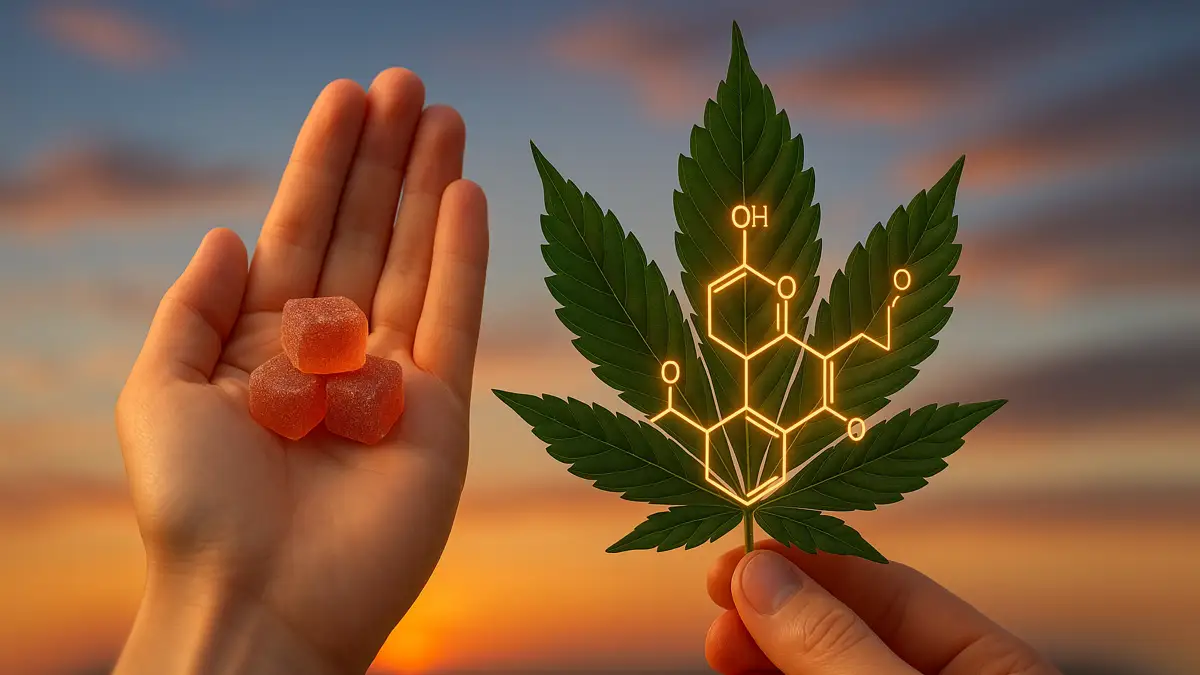May 16, 2025
Delta 8 vs Delta 9 THC: Scientific and Safety Differences

No delta‑8 product has been evaluated or approved for safe use by the FDA. From late 2020 to early 2022, the agency received more than 100 adverse‑event reports linked to delta‑8, over half requiring hospital care. U.S. poison‑control centers logged thousands of delta‑8 exposures, 41 % involving children.
Delta‑8 THC and delta‑9 THC are two closely related compounds that have gained significant public attention in recent years. Both are forms of tetrahydrocannabinol (THC) – the primary psychoactive chemicals found in cannabis – but they are not identical. With the rise of delta‑8 products on the market (often marketed as a “legal high” or a milder alternative), many people are asking questions like “delta 8 vs delta 9 – what’s the difference?” and “is delta 8 safe to use?”
This article provides an educational comparison of delta‑8 versus delta‑9 THC, focusing on scientific distinctions and safety considerations. Importantly, this neutral overview is intended for informational purposes – neither substance is being promoted, and understanding the differences is crucial, especially from a health‑and‑safety perspective.
What Are Delta‑8 THC and Delta‑9 THC?
Delta‑9‑tetrahydrocannabinol (delta‑9 THC) is the well‑known psychoactive compound responsible for the classic cannabis “high.” It occurs abundantly in marijuana (a variety of Cannabis sativa) and strongly binds to cannabinoid receptors in the brain.3 Delta‑8‑tetrahydrocannabinol (delta‑8 THC) is an isomer of delta‑9 – meaning it has the same chemical formula but a slightly different arrangement of atoms.4 That subtle difference alters how it interacts with the body’s endocannabinoid system.3 Delta‑9 THC is naturally abundant in cannabis, whereas delta‑8 THC is present only in trace amounts.5 Because delta‑8 is not naturally plentiful, most commercial products are synthesized by chemically converting hemp‑derived cannabidiol (CBD) into delta‑8 THC.6
Potency and Psychoactive Effects
When comparing delta 8 vs delta 9, research suggests delta‑8’s psychoactive strength is roughly half to two‑thirds that of delta‑9.3 A 2021 survey of delta‑8 users reported relaxation, euphoria and pain relief, with fewer instances of anxiety or paranoia than with delta‑9 products.3 Nonetheless, both compounds impair cognition, judgment and coordination.
Production and Regulatory Differences
Delta‑9 THC products in regulated states undergo testing for potency and contaminants. Delta‑8 THC products, by contrast, often fall into a legal gray area and may be manufactured in unlicensed laboratories, leaving residual solvents and reaction by‑products in the final product.1 The U.S. Food & Drug Administration warns that some delta‑8 manufacturers use unsafe chemicals and child‑appealing packaging. Several states have moved to restrict or ban delta‑8 sales in response.1, 7
Safety Concerns and Side Effects
No delta‑8 product has been evaluated or approved for safe use by the FDA.2 From late 2020 to early 2022, the agency received more than 100 adverse‑event reports linked to delta‑8, over half requiring hospital care. U.S. poison‑control centers logged thousands of delta‑8 exposures, 41 % involving children.2
These data highlight that delta 8 safety is far from assured. High‑dose edibles have led to hallucinations, anxiety, vomiting and even loss of consciousness.8 Independent lab tests reveal unknown cannabinoids and heavy‑metal contaminants in some products.9 Experts stress that rigorous testing and regulation are essential before any delta‑8 product can be considered safe.10
Conclusion: Comparing Delta‑8 vs Delta‑9 for Safety and Science
Delta‑8 THC and delta‑9 THC share intoxicating properties but differ in potency, natural abundance and regulatory oversight. Delta‑9 products in legal markets are lab‑tested; delta‑8 products often are not. While delta‑8 may feel milder, milder does not mean safe. Unregulated synthesis, inaccurate labeling and child‑appealing packaging have resulted in hospitalizations and poisonings.
If you or someone you know is considering delta‑8, understand that both forms of THC can impair cognition, carry dependence risks and interact unpredictably with individual health conditions. The safest approach is to avoid unsupervised use and consult a healthcare professional.
References
U.S. Food & Drug Administration. 5 Things to Know about Delta‑8 Tetrahydrocannabinol (Delta‑8 THC).
2021.
U.S. Food & Drug Administration. Adverse Event Reports Involving Delta‑8 THC Products (CAERS Poster).
2022.
Kruger JS, Kruger DJ. Delta‑8‑THC: Delta‑9‑THC’s Nicer Younger Sibling? Journal of Cannabis Research (2022).
Abdel‑Kader MS et al. Chemistry and Pharmacology of Delta‑8‑Tetrahydrocannabinol. Molecules 29(6):1249 (2023).
Pennypacker SD et al. Potency and Therapeutic THC and CBD Ratios: U.S. Cannabis Markets Overshoot. Frontiers in Pharmacology 13:921493 (2022).
Wang M et al. Delta‑8‑Tetrahydrocannabinol: Comparative Pharmacology, Toxicology and Metabolism. British Journal of Pharmacology (2023).
National Conference of State Legislatures. State Medical and Adult‑Use Cannabis Laws. Updated 2025.
National Institute on Drug Abuse. Cannabis (Marijuana): Research Topics.
2024 update.
Kaczor EE et al. Commercial Delta‑8 THC Products: An Analysis of Content and Labeling. Journal of Medical Toxicology 20(1):31‑38 (2024).
Dryburgh LM et al. Cannabis Contaminants: Sources, Distribution, Human Toxicity and Pharmacologic Effects. British Journal of Clinical Pharmacology 84(11):2468‑2476 (2018).









